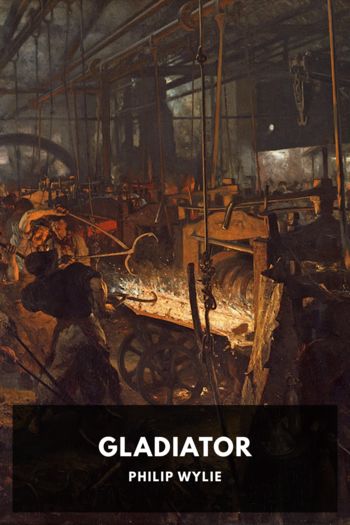Gladiator - Philip Wylie (readnow .TXT) 📗

- Author: Philip Wylie
Book online «Gladiator - Philip Wylie (readnow .TXT) 📗». Author Philip Wylie
Beyond that, he could see destiny by interpreting his limited career. Through a sort of ontogenetic recapitulation he had survived his savage childhood, his barbaric youth, and the Greeces, Romes, Egypts, and Babylons of his early manhood, emerging into a present that was endowed with as much aspiration and engaged with the same futility as was his contemporary microcosm. No life span could observe anything but material progress, for so mean and inalterable is the gauge of man that his races topple before his soul expands, and the eventualities of his growth in space and time must remain a problem for thousands and tens of thousands of years.
Searching still further, he appreciated that no single man could force a change upon his unwilling fellows. At most he might inculcate an idea in a few and live to see its gradual spreading. Even then he could have no assurance of its contortions to the desire for wealth and power or of the consequences of those contortions.
Finally, to build, one must first destroy, and he questioned his right to select unaided the objects for destruction. He looked at the Capitol in Washington and pondered the effect of issuing an ultimatum and thereafter bringing down the great dome like Samson. He thought of the churches and their bewildering, stupefying effect on masses who were mulcted by their own fellows, equally bewildered, equally stupefied. Suppose through a thousand nights he ravaged the churches, wrecking every structure in the land, laying waste property, making the loud, unattended volume of worship an impossibility, taking away the purple-robed gods of his forbears? Suppose he sank the navy, annihilated the army, set up a despotism? No matter how efficiently and well he ruled, the millions would hate him, plot against him, attempt his life; and every essential agent would be a hypocritical sycophant seeking selfish ends.
He reached the last of his conclusions sitting beside a river whither he had walked to think. An immense loathing for the world rose up in him. At its apex a locomotive whistled in the distance, thundered inarticulately, and rounded a bend. It came very near the place where Hugo reclined, black, smoking, and noisy, drivers churning along the rails, a train of passenger cars behind. Hugo could see the dots that were people’s heads. People! Human beings! How he hated them! The train was very near. Suddenly all his muscles were unsprung. He threw himself to his feet and rushed toward the train, with a passionate desire to get his fingers around the sliding piston, to upend the locomotive and to throw the ordered machinery into a blackened, blazing, bloody tangle of ruin.
His lips uttered a wild cry; he jumped across the river and ran two prodigious steps. Then he stopped. The train went on unharmed. Hugo shuddered.
If the world did not want him, he would leave the world. Perhaps he was a menace to it. Perhaps he should kill himself. But his burning, sickened heart refused once more to give up. Frenzy departed, then numbness. In its place came a fresh hope, new determination. Hugo Danner would do his utmost until the end. Meanwhile, he would remove himself some distance from the civilization that had tortured him. He would go away and find a new dream.
The sound of the locomotive was dead in the distance. He crossed the river on a bridge and went back to his house. He felt strong again and glad—glad because he had won an obscure victory, glad because the farce of his quest in political government had ended with no tragic dénouement.
They were electrocuting Davidoff and Pletzky that day. The news scarcely interested Hugo. The part he had very nearly played in the affair seemed like the folly of a dimly remembered acquaintance. The relief of resigning that impossible purpose overwhelmed him. He dismissed his servants, closed his house, and boarded a train. When the locomotive pounded through the station, he suffered a momentary pang. He sat in a seat with people all around him. He was tranquil and almost content.
XXIIIHugo had no friends. One single individual whom he loved, whom he could have taken fully into his confidence, might, in a measure, have resolved his whole life. Yet so intense was the pressure that had conditioned him that he invariably retreated before the rare opportunities for such confidences. He had known many persons well: his father and mother, Anna Blake, Lefty Foresman, Charlotte, Iris, Tom Shayne, Roseanne, even Skorvsky—but none of them had known him. His friendlessness was responsible for a melancholy yearning to remain with his kind. Having already determined to go away, he sought for a kind of compromise.
He did not want to be in New York, or Washington, or any other city; the landscape of America was haunted for him. He would leave it, but he would not open himself to the cruel longing for his own language, the sight of familiar customs and manners. From his hotel in New York he made excursions to various steamship agencies and travel bureaus. He had seen many lands, and his Wanderlust demanded novelty. For days he was undecided.
It was a chance group of photographs in a Sunday newspaper that excited his first real interest. One of the pictures was of a man—erect, white-haired, tanned, clear-eyed—Professor Daniel Hardin—a procession of letters—head of the new expedition to Yucatan. The other pictures were of ruined temples, unpiled stone causeways, jungle. He thought instantly that he would like to attach himself to the party.
Many factors combined to make the withdrawal offered by an expedition ideal. The more Hugo thought about it, the more excited he became.





Comments (0)